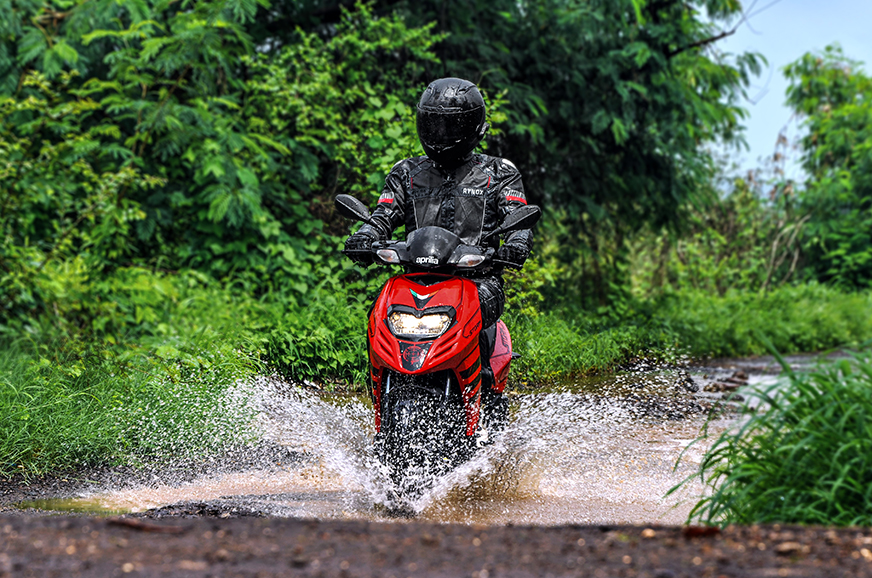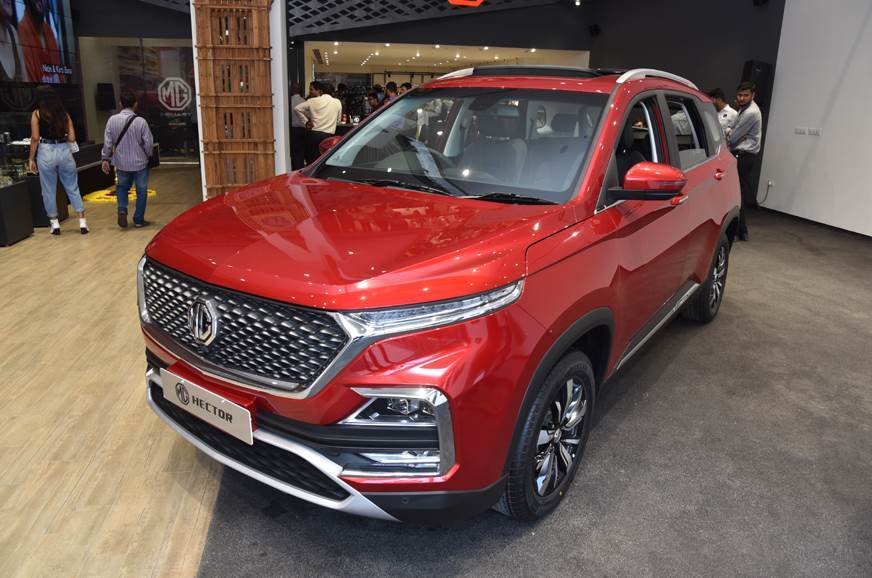
India's scooter buyer has matured and multiple 125cc offerings now make the top-10 scooter sales list. Piaggio wasn't pushing anywhere near these numbers, which doesn't come as a surprise because our market is a really price sensitive one and Aprilias (let alone the Vespas), as we know, are expensive. The company, however, now has an offering – the Storm 125 – that is essentially a stripped-down version of the SR125, and not only is it India's most affordable Aprilia, but also the world's. Here's what it's like.
What does it look like?
The Storm 125 unveiled at the 2018 Auto Expo was quite different to the one you see here. That scooter featured a large windscreen, unique shuriken-shaped five-spoke wheels and a disc brake at the front. Aprilia appears to have explicitly ditched those features in favour of a more attainable price tag (more on that later). What the scooter does get though, are the matte red and yellow colour scheme and elaborate stickers all over. The colours don’t look bad, and help differentiate it from the SR models, but the graphics are a bit of a love-it-or-hate-it affair.
Another aspect the company should have reconsidered is the dated-looking wheels. These three-spoke units look like they have been taken off a TVS Scooty from 1996, and they don't merge well with the sleek and modern bodywork the Storm borrows from the SR. Thankfully, the oversized tyres make up for it in terms of visual drama and they do well to fill up the wheel arches, even though the wheels are now two inches smaller. Everything else remains unchanged from the SR125, including the analogue instrumentation, compact under-seat storage space and tall wing-like grab handle.
What's new with the engine?
Nothing, really. The 9.5hp/9.9Nm, 124cc, single-cylinder, three-valve air-cooled engine on the Storm is borrowed from the SR125. While the Storm, or even the SR125, for that matter isn’t as quick as the SR150, it feels faster than almost everything else in its segment, with the exception of the TVS Ntorq 125. A big reason why this scooter feels so quick is because the speedometer is very optimistic – 80kph comes up with ease and the speedo needle keeps climbing, even crossing 120kph, where the markings on the speedo end. Don’t fall for it though, because our Vbox reveals that the true top speed is just about at the 100kph mark. Still, that's quick for any scooter in this segment. Just like its siblings, the Storm too makes a gruff sound, but actually feels pleasantly smooth and unstressed throughout the rev range.
What is it like to ride?
One of the highlights of this scooter is the wide off-road-oriented tyres it rides on. Made by Vee rubber, they measure 120/80-12 at the front and 130/80-12 at the rear. In comparison, the SR sports 120/70-14 at both ends. However, it’s not their tread pattern or impressive width that makes a significant difference in the way the scooter rides, but the diameter. The Storm rides on 12-inch wheels and not on 14s like the SRs, and this comes with positives and negatives.
To start on a good note, the steering on the Storm feels quicker, it goes the direction you point it in instantaneously. This agile feeling is great in city traffic, but not so much at higher speeds, where the scooter feels more nervous than its 14-inch-wheel shod siblings. Moreover, bumps, expansion joints and reflectors upset the balance a lot more easily. That said, these traits are expected with smaller wheels and a direct comparison to the SRs isn’t fair, especially when the Storm is more cost efficient. And when compared to other 125s on the market, the Storm is still very stable, thanks to its long wheelbase.
Despite running on the same suspension setup as the SRs, the Storm’s front end feels a little more forgiving, thanks to the taller sidewalls, as well as the fact that this tyre feels a bit softer. That said, rough roads continue bring out a very firm and jittery feeling from the fork. The monoshock is acceptably pliant, but this one doesn’t get preload-adjustability. Thankfully, I found that the seat isn’t overly firm and crunching longer distances on it shouldn’t be a problem, although this is something that seems to split opinion.
Our main grievance is that Aprilia has opted out of offering a disc brake on the Storm and it can only be had with CBS-equipped drum brakes at both ends. The front brake works performs well for what it is, with a decent amount of bite and modulation, but there is no escaping that it has its limitations. A disc offers more confidence and consistency, especially in the wet, and it won’t need frequent adjusting. Apart from that, a disc-brake on a 125cc scooter should be a given; but here, it’s not even an option.
Should I buy one?
At Rs 65,000 (ex-showroom, India), the Storm 125 may not seem affordable, that is, until you hear the prices of the SR125 (Rs 72,000) and SR150 (Rs 82,000-92,000). When compared to its rivals though, it remains an Aprilia – in that it is priced a step above. Our segment favourite, the TVS Ntorq costs Rs 58,872 with a drum and Rs 59,995 with a disc, and that's a slippery slope for the Aprilia. So why would you buy a Storm 125? Well, it would only make sense if you are in love with the design and the brand, but can't shell out the extra silver for the SRs.
Also see:
2018 Aprilia SR125 review, test ride
Aprilia Storm 125 vs rivals: Price, specifications comparison
from Autocar India https://ift.tt/32Zxkgt
via IFTTT

No comments:
Post a Comment